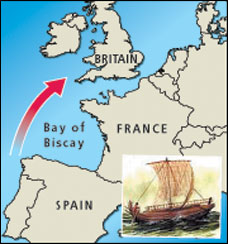The Celtic British (Scots, Welsh, and Irish) are the descendants of a tribe of Spanish fishermen.
So it's not just the English - who are the descendants of Germans, Danes and Frisians - who are foreigners to these islands.
------------------------------------------------------------------
Ancient Britons come mainly from Spain
20th September 2006

Ola! Celtic Britons have Spanish descendants
Scientists have discovered the British are descended from a tribe of Spanish fishermen. DNA analysis has found the Celts — Britain's indigenous population — have an almost identical genetic "fingerprint" to a tribe of Iberians from the coastal regions of Spain who crossed the Bay of Biscay almost 6,000 years ago.
People of Celtic ancestry were thought to have descended from tribes of central Europe. But Bryan Sykes, professor of human genetics at Oxford University, said: "About 6,000 years ago Iberians developed ocean-going boats that enabled them to push up the Channel.
"Before they arrived, there were some human inhabitants of Britain, but only a few thousand. These people were later subsumed into a larger Celtic tribe... the majority of people in the British Isles are actually descended from the Spanish."
A team led by Professor Sykes — who is soon to publish the first DNA map of the British Isles — spent five years taking DNA samples from 10,000 volunteers in Britain and Ireland, in an effort to produce a map of our genetic roots.
The most common genetic fingerprint belongs to the Celtic clan, which Professor Sykes has called "Oisin". After that, the next most widespread originally belonged to tribes of Danish and Norse Vikings. Small numbers of today's Britons are also descended from north African, Middle Eastern and Roman clans.
These DNA fingerprints have enabled Professor Sykes to create the first genetic maps of the British Isles, which are analysed in his book Blood Of The Isles, published this week. The maps show that Celts are most dominant in Ireland, Scotland and Wales.
But the Celtic clan is also strongly represented elsewhere in the British Isles. "Although Celts have previously thought of themselves as being genetically different from the English, this is emphatically not the case," said Professor.
dailymail.co.uk
So it's not just the English - who are the descendants of Germans, Danes and Frisians - who are foreigners to these islands.
------------------------------------------------------------------
Ancient Britons come mainly from Spain
20th September 2006

Ola! Celtic Britons have Spanish descendants
Scientists have discovered the British are descended from a tribe of Spanish fishermen. DNA analysis has found the Celts — Britain's indigenous population — have an almost identical genetic "fingerprint" to a tribe of Iberians from the coastal regions of Spain who crossed the Bay of Biscay almost 6,000 years ago.
People of Celtic ancestry were thought to have descended from tribes of central Europe. But Bryan Sykes, professor of human genetics at Oxford University, said: "About 6,000 years ago Iberians developed ocean-going boats that enabled them to push up the Channel.
"Before they arrived, there were some human inhabitants of Britain, but only a few thousand. These people were later subsumed into a larger Celtic tribe... the majority of people in the British Isles are actually descended from the Spanish."
A team led by Professor Sykes — who is soon to publish the first DNA map of the British Isles — spent five years taking DNA samples from 10,000 volunteers in Britain and Ireland, in an effort to produce a map of our genetic roots.
The most common genetic fingerprint belongs to the Celtic clan, which Professor Sykes has called "Oisin". After that, the next most widespread originally belonged to tribes of Danish and Norse Vikings. Small numbers of today's Britons are also descended from north African, Middle Eastern and Roman clans.
These DNA fingerprints have enabled Professor Sykes to create the first genetic maps of the British Isles, which are analysed in his book Blood Of The Isles, published this week. The maps show that Celts are most dominant in Ireland, Scotland and Wales.
But the Celtic clan is also strongly represented elsewhere in the British Isles. "Although Celts have previously thought of themselves as being genetically different from the English, this is emphatically not the case," said Professor.
dailymail.co.uk